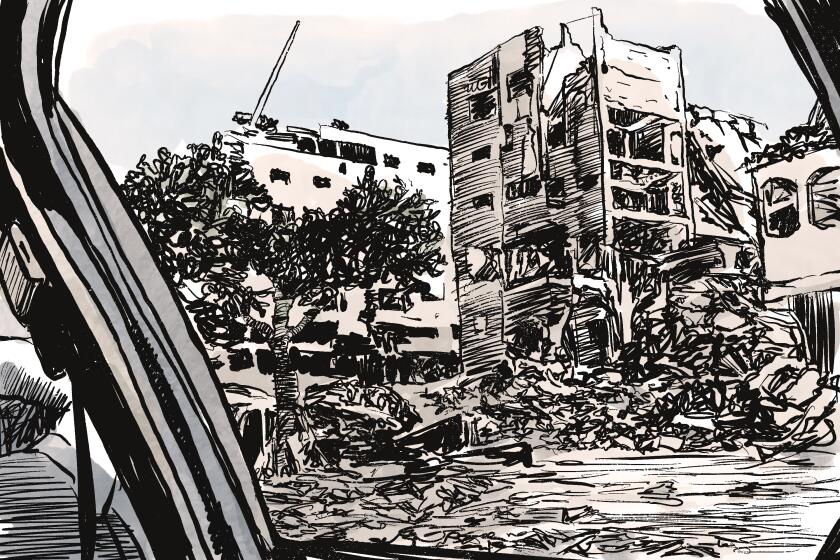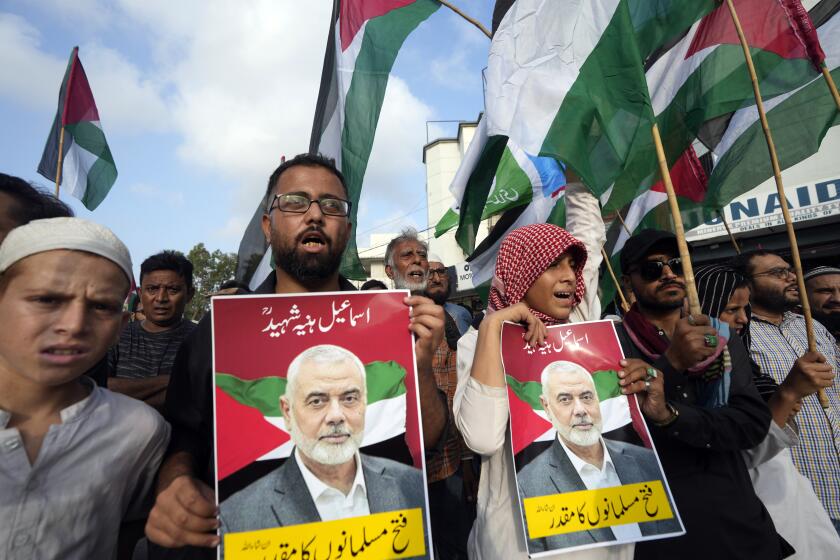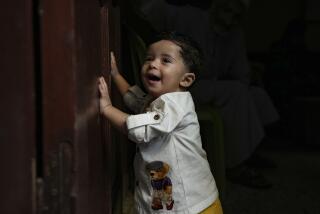
- Share via
BEIRUT — Clutching the birth certificates for his 4-day-old twins, Mohammad Abu Al-Qumsan strained against the crowd around Gaza’s Al Aqsa Martyrs Hospital morgue and screamed to see his family one last time.
“I want to see my kids. I beg you. I beg you!” he said in a video recorded by a local journalist and posted on social media. Finally, he fainted into the arms of one of the men trying to console him.
Tuesday morning Abu Al-Qumsan left his apartment in the Gaza city of Deir al Balah to register the births of his son, Asser, and daughter, Aysal, leaving them at home with his wife, Jumana, 28, and her mother, Arafa, his friends told The Times.
The certificates were in his hand, freshly laminated, when he got the phone call from a neighbor, telling him the apartment had been hit in an Israeli strike. His family was gone.
“I didn’t even have a chance to enjoy them,” Abu Al-Qumsan said in a text message Tuesday to The Times.
Since Israel’s siege and bombing campaign on Gaza started after Hamas’ Oct 7 attack, the humanitarian situation on the ground has become disastrous.
The twins’ death adds to the gruesome tally of 115 infants born and killed in the last 10 months, according to the Palestinian Health Ministry in Gaza.
The Israel Defense Forces told The Times that “the details of the incident as published are not currently known to the IDF.” Army officials said it “targets only military objectives and employs various measures to minimize harm to civilians.”
Abu Al-Qumsan, who is unemployed but previously worked for a plastics supply company, and Jumana, a pharmacist who rose to become an executive director at Maxcare, a health and beauty company, married in July last year, friends say.
On Oct. 7, Hamas militants attacked southern Israel, killing about 1,200 Israelis and kidnapping 250 more. The attack spurred a fierce military response from Israel, which so far has killed almost 40,000 Palestinians and left more than twice that number wounded, according to Palestinian authorities, whose figures do not differentiate between combatants and civilians.
Hamas political leader Ismail Haniyeh was a key figure in negotiations to end Israel-Hamas war. How will the U.S. react?
About a month after the war started, Jumana conceived twins. The couple’s married life became a series of displacements as they fled from Gaza City to various other parts of the enclave in accordance with instructions from the Israeli military to escape Israeli bombings.
They settled in an apartment building in Deir Al-Balah, but Jumana still worried, friends say.
“She was so afraid for them,” said Islam Hijazi, program director of HEAL Palestine, a charity that provided prenatal care to Jumana in the final three months of her pregnancy. “She would say, ‘It’s better they stay in my womb. It’s so unsafe out here.’”
After Jumana delivered the twins by caesarean section, she sent a voice message Monday night to the local HEAL Palestine staff, thanking them for their help.
“The next morning, the staff all gathered to hear the recording,” Hijazi said. “Everyone was so happy.”
Then came the news of her killing.
“We were all shocked,” Hijazi said. “I couldn’t believe it was the same person whose voice we had heard a few hours ago.”
The attack was one of several that killed at least 32 people that day, according to Palestinan tallies.
Friends and colleagues said that to their knowledge neither Abu Al-Qumsan nor Jumana had any link to Hamas or any other militant group operating in Gaza.
“There’s just no justification. None,” said Murad Matar, Jumana’s boss at Maxcare, who worked with her for three years and was friends with both her and her husband. “The Israelis have all this technology. They target with artificial intelligence, they strike based on voiceprint, on phone signals. Couldn’t they verify? Why did they attack this family?”
Jumana announced the birth of the twins in a Facebook post Sunday, replying to every message of congratulations, including one from her friend Rawand Emawi, who owns a beauty center in Gaza and saw Jumana frequently.
“There wasn’t enough time to celebrate the occasion,” Emawi said. “Even the post in which I congratulated her, it’s now turned to condolences.”
More to Read
Sign up for Essential California
The most important California stories and recommendations in your inbox every morning.
You may occasionally receive promotional content from the Los Angeles Times.













